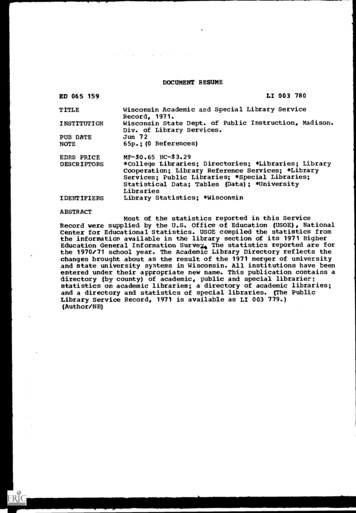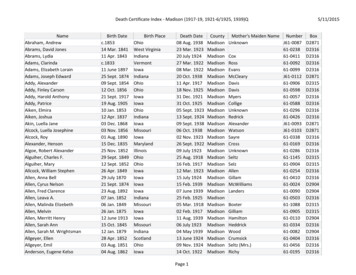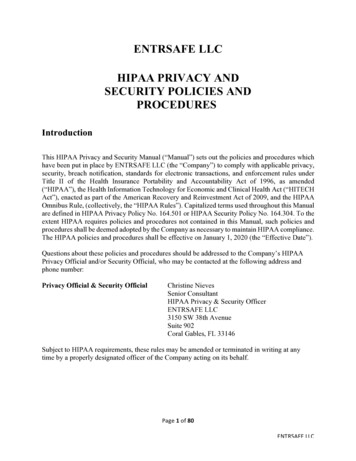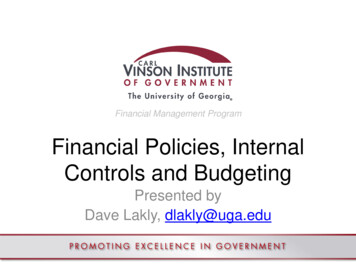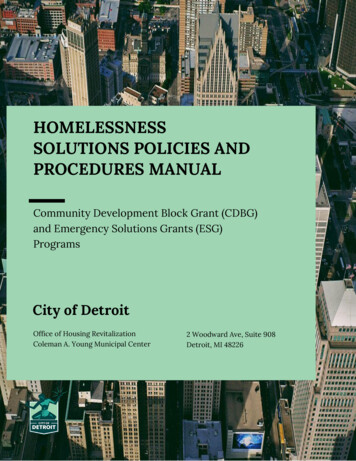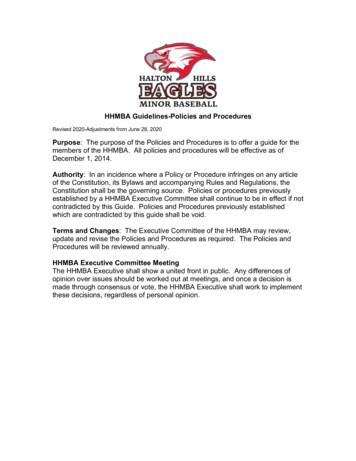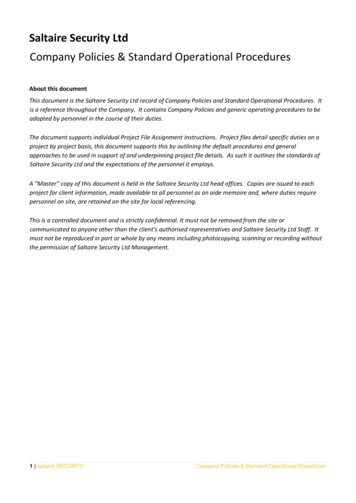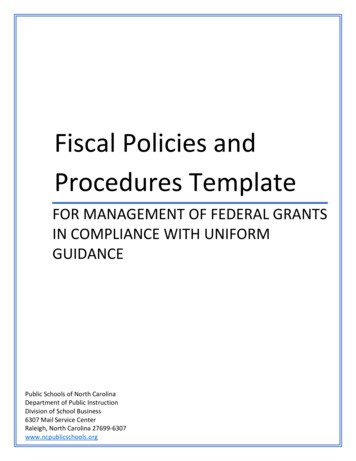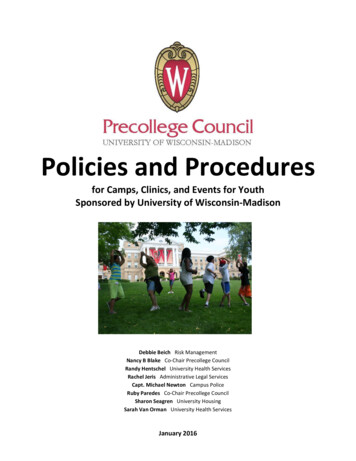
Transcription
Policies and Proceduresfor Camps, Clinics, and Events for YouthSponsored by University of Wisconsin-MadisonDebbie Beich Risk ManagementNancy B Blake Co-Chair Precollege CouncilRandy Hentschel University Health ServicesRachel Jeris Administrative Legal ServicesCapt. Michael Newton Campus PoliceRuby Paredes Co-Chair Precollege CouncilSharon Seagren University HousingSarah Van Orman University Health ServicesJanuary 2016
Table of ContentsRequirements for Youth Programs Requirements by Program TypeTerminologyData Submission ChecklistPrecollege Program Information SheetAdult to Student RatiosLegal Requirements Background Check Policy for Camps Mandatory Reporting Requirements 2-Deep PolicyRisk Management Requirements Risk Management Policy Notice of Injury Form Driver AuthorizationHealth Forms and Policies UHS Service Overview Youth Event Health FormEmergency Procedures Lost Camper Procedures Lost Swimmer Procedures Emergency Procedures GuideVolunteers Volunteer Fact Sheet Volunteer LetterThird Party Program/Event Program RequirementsAdditional Resources Division of Recreational Sports University Resources UW Precollege Contacts
Requirementsfor Youth Programs
Requirements by Program Type
TerminologyLicensureRecreational & Educational Camps are required to be licensed by the Wisconsin Department of Agriculture,Trade, & Consumer Protection (DATCP). A camp is defined as a planned program of recreation or educationfor more than 3 consecutive nights. UW Madison Campus holds two licenses, one for is by the AthleticDepartment and the other is the Precollege Programs Council. All programs serving youth on campus mustbelong to one of these organizations, or must obtain their own license.UW Residential ProgramsSome or all participants stay overnight, on or off campus, while attending the program. Requirements varydepending upon the program location and type of lodging as well as by the duration of the program.UW Commuter ProgramsNo participants stay overnight; all participants leave at the end of each day. Programs are of 2 or more days induration and can take place on or off campus. Requirements vary depending upon the location of the programand are grouped into the following categories:Campus Visits 1 day, UW sponsorship, on campuso The University department sponsoring the event will be responsible for all administrative andfinancial obligations associated with the facility use.1 day, UW co-sponsorship, on campuso Event that is sponsored by two parties, including at least one university group. The cosponsoring university group/s will be responsible for all administrative and financial obligationsassociated with the facility use.1 day, UW Staff at Off-Campus Visito UW Staff attends an event that is held off campus as part of their job/position responsibilities.Third Party ProgramA program or event that is being run by a non-university entity at the invitation of a UW-Madison department,(school/ college/ division) or a program operated by a UW-Madison department that is not affiliated with theAthletic Department or Precollege Council.All third party programs must obtain a DATCP license through the UW-Madison office of Environmental &Occupational Health. The license fee shall be the same as required by DATCP including a pre-inspection fee forthe first year. All third party camps are responsible to provide a health supervisor and on-site health careproviders as required by DATCP.Such programs must be related to the mission of the University as determined by the Dean or Director of theinviting School/college/division. The inviting school/college/division and the non-university entity areresponsible for all administrative and financial obligations associated with the facility use and otherrequirements in this policy. A written contract must be created with the third party based on a templateavailable from Administrative Legal Services.All Third Party programs AND programs not included in the UW-Madison Precollege Council are responsiblefor obtaining a license and following all licensing requirements
Data Submission ChecklistRESIDENTIAL PROGRAMS By November 1: Email a copy of your program brochure and the completed ProgramInformation Sheet (see next page) to Housing, University Health Services, and RiskManagement. By Individual Due Date: Send signed confirmation letter to Housing Two Weeks Prior to Program Start: Email Housing, University Health Services, and RiskManagement a complete staff list with contact information Within Three Days of Program Completion: Email Risk Management a complete studentroster with names only. Include the program funding string in the email. By September 1: Email photos with captions to Precollege Council. Also complete thePrecollege Program Online Survey, which includes program title, dates/times, number ofstudents, program contact information, program mission, department, targetedpopulation, summary of data, outcomes, and testimonials:COMMUTER PROGRAMS Two Weeks Prior to Program Start: Send room list and contact information for one staffmember to Campus police for WEEKEND and/or EVENING programs only:routesecurity@mhub.uwpd.wisc.edu (room locations for residential programs are sentto Campus Police by Housing) Within Three Days of Program Completion: Email Risk Management a complete studentroster with names only. Include the program funding string in the email. By September 1: Email photos with captions to Precollege Council. Also complete thePrecollege Program Online Survey, which includes program title, dates/times, number ofstudents, program contact information, program mission, department, targetedpopulation, summary of data, outcomes, and testimonials:
Precollege Program Information SheetDue to Housing, UHS, Risk Management, Precollege Council by Nov. 1:ProgramProgram NameProgram Dates-include details ifmore than one session is plannedSponsoring DepartmentContact PersonPhoneE-mailDepartmental Funding StringProgram OverviewDescribe your program includingthe goals and relation to themission of UW-Madison and/oryour departmentDescribe the target participantsages, geographic distribution,other demographic characteristics,etc Provide a brief description of theplanned activitiesDescribe the proposed programlocations including any off-campussites and planned field tripsDetailed Program Information-Session 1Complete separate information for each planned sessionEstimated number of commuter participantsEstimated number of residential participantsPlanned Housing FacilityParticipant age rangeCheck-in Dates/TimesCheck-out Dates/Times
Adult to Student RatiosGrade GroupSituationRatios (Adult : Student)PreK-1(age 3-4)Commuter1:4PreK-1(age 4-5)Commuter1:6PreK-1(age 5-6)Commuter1:10PreK-1(age 6 & under)Residential1:42-4(over age 6)In ClassroomWalking/Transitional/LunchField TripResidentialCommuter1:101:101:101:101:105-8In ClassroomWalking/Transitional/LunchField TripWater Activities/Rec. SportsResidential & Commuter1:201:201:101:10Overall program staff to student ratio must be 1:10In ClassroomWalking/Transitional/Lunch1:18No adults necessary at the discretion of the programdirector; dependent on maturity level of students andfamiliarity with campus. Students must always be ingroups of 3 or more. Programs must establish writtenprocedures to ensure all students are accounted for atregular intervals and at the start of each activity.1:101:10Overall program staff to student ratio must be 1:109-12Field TripWater Activities/Rec. SportsResidential & Commuter
Legal Requirements
UW-Madison Criminal Background CheckPolicy and ProceduresPurposeTo ensure the University of Wisconsin – Madison is a safe and secure environment for all students, employees andvisitors.PolicyUW-Madison will comply with the Board of Regent policy that UW institutions conduct a criminal backgroundcheck on applicants for employment, certain current employees, and certain volunteers. In addition, UW-Madisonwill satisfy the criminal background check requirement for certain vendors/contractors, and certain users andlessees of university lands and facilities.Effective DateCreated December 1, 2007Amended effective December 2, 2013.Updated January 2016ProceduresI. Introduction – The Board of Regents adopted a resolution on December 8, 2006 that requires the implementationof a UW System-wide criminal background check policy for new employees and current employees movingto positions of trust. On December 7, 2012, the Board of Regents amended the resolution to require criminalbackground checks be conducted on current employees and volunteers holding a “position of trust withaccess to vulnerable populations” as defined in section VII of this revised policy who have not previouslybeen subject to such a criminal background check by the University. Employees and volunteers holding aposition of trust with access to vulnerable populations shall also be subject to a criminal background checkevery four years, except that employees and volunteers with duties involving contact with minors inprecollege camps (multi-day and overnight programs) shall be subject to a criminal background check everytwo years. Employees and volunteers with access to vulnerable populations or who have duties involvingcontact with minors in precollege camps shall be required to self-disclose certain criminal offenses. The UWSystem-wide policy also requires each institution to develop procedures for implementing the policy. Thisdocument comprises those procedures for UW-Madison.II. Relationship to Existing Legal Mandates – There are state and federal laws and regulations that requirecriminal background checks in certain circumstances. The UW System-wide criminal background checkpolicy and these UW-Madison procedures do not replace these mandates. The most common mandates arelisted below. There are other mandates that apply to a small number of very specific positions not listed here(e.g., police officers, nuclear reactor operators, commercial drivers).
a. Wisconsin Caregiver Law – Wisconsin law requires criminal history background checks of personsresponsible for the care, safety, and security of children and vulnerable adults. This mandate requirescriminal background checks for licensed individuals, employees, prospective employees, and otherspecified persons affiliated with care giving entities or providers. Criminal convictions related to theharm of another human being are generally a bar from employment for positions within health caresettings. Employers bound by this law need to not only check prospective employees but also check thecriminal history of employees every four years. There is also an expectation that employees report anycriminal activity when it occurs.b. Select Agents - The Public Health Security and Bioterrorism Preparedness and Response Act of 2002 andthe Agricultural Protection Act of 2002 require entities to register with the U.S. Department of Healthand Human Services (HHS) or Agriculture (USDA) if they possess, use, or handle biological agents ortoxins that could pose a severe threat to public health and safety; to animal or plant health; or animal orplant products. As part of this “select agent” registration, these entities must have security measures inplace including controlling access and screening personnel, including current employees and students,who are handling these select agents (i.e., security risk assessments must be done). These assessmentsrequire individuals handling the select agents be screened by the FBI to determine security risk, beapproved by the Centers for Disease Control (CDC) and/or undergo a suitability assessment dependingon the materials being accessed.c. Fiduciary Responsibilities – Wisconsin law requires that when any state position involving fiduciaryresponsibility is to be filled, the employer must conduct a criminal background check on the candidatebefore offering employment. This is defined by the state as positions where the principal duties (i.e., 50percent or greater) are to:1. Handle, receipt for, or have custody of money, checks or securities, or account for supplies or otherproperty; authorize (or make appropriations for) expenditures; approve, certify, sign or countersignchecks, drafts, warrants, vouchers, orders or other documents providing for the paying over ordelivery of money, securities, supplies or other property, or serve process; or2. Maintain or audit accounts of money, checks, securities, time records, supplies or other property, ortake physical inventories of money, checks, securities, supplies or other property.d. Criminal Justice Data Access – Any employees, contractors or volunteers with access to FBI CriminalJustice Information (CJI) are subject to state and federal fingerprint-based record checks per the FBICriminal Justice Information Services (CJIS) policy. This includes electronic access to the actual CJIrecords or working around these records in a secure facility (e.g., UW Police Department). The UWPolice Department will work with the divisional HR representatives, as appropriate, to coordinate thefingerprint-based record checks for employees with this access.
III. UW Regent Policy Requirements for Hiring New Employees – UW-Madison divisions will incorporate thefollowing steps into their hiring and selection process. This applies to all vacancies except when hires aremade in student hourly, employee-in-training, and LTE appointments or when employees move from anotherUW campus or state agency, unless the vacancy involves a position of trust. If an individual is returning tothe UW after less than a one-year absence, it is not required that a new check be done unless the employee ismoving to a position of trust.Note: the UW requirement to conduct criminal background checks does not apply to non-employeeappointments such as Fellows and Postdoctoral Fellows unless required by law or is defined as aposition of trust.a. Announcing a Vacancy – All vacancy announcements (including advertisements) should contain thestatement “Employment will require a criminal background check.” This statement is included in thecampus human resources systems (JEMS) for insertion in all position materials.b. Offering a Position – Divisions are expected to complete criminal background checks prior to making anoffer of employment. If a check cannot be completed before an offer is made, the check must becompleted before the individual begins employment unless an exception is granted by the appropriatedean or director. In any event, the criminal background check must be completed and a decision made nolater than 60 days after the start of employment.In most cases, only the finalist being offered the position will be checked. However, there may becircumstances where more than one applicant is checked (e.g., chancellor, dean, or provost search).c. Appointment Letters – If a check cannot be completed before an offer is made, the appointment lettermust state that the offer will be withdrawn or the employment terminated if the individual’s criminalbackground check results are unacceptable. The following statement must be used in the appointmentletter.“This offer of employment is conditional pending the results of a criminal background check. If theresults are unacceptable, the offer will be withdrawn or, if you have started employment, youremployment will be terminated.”However, under no circumstances can an individual start employment in a position of trust with access tovulnerable populations without a completed criminal background check.d. Consent – Prior to conducting a criminal background check, divisions are required to use the onlineconsent process or have the employee sign a consent form (see attached). If the individual declines toprovide the consent for the check, he/she can no longer be considered a candidate for the vacancy.IV. Coverage of Volunteers – UW-Madison divisions shall perform criminal background checks on prospectivevolunteers when the volunteer position involved is a position of trust, or when required by law. In makingthis determination, consideration should be given to the level of direct supervision and guidance provided tovolunteers and the nature of the duties of the volunteer position.
Criminal background checks must be conducted on current volunteers who have not previously been subjectto a criminal background check by the University, and that hold a position of trust with access to vulnerablepopulations as defined in section VII of this policy. A criminal background check must be performed everyfour years on volunteers in a position of trust with access to vulnerable populations or every two years onvolunteers who have contact with minors in a precollege camp.V. UW Regent Policy for Vendors/Contractors - To the maximum extent feasible, any agreement with a vendor orcontractor whose employees, affiliates, or volunteers will have routine or unsupervised access to vulnerablepopulations (minors or medical patients) in the course of the contract must include a representation from thevendor or contractor stating that these employees, affiliates, or volunteers have satisfied a criminalbackground check that includes a national criminal background check database. Divisions will need toidentify those vendors/contractors who fall under this policy and subsequently work with PurchasingServices, Office of Legal Affairs, and the Office of Human Resources to ensure compliance.VI. Coverage of Certain Users and Lessees of University Lands and Facilities - Facilities use agreements orleases with outside organizations that use or lease University lands and facilities to operate multi-dayprograms for minors, or programs for minors that involve an overnight stay, must include a representationfrom the organization that its employees, affiliates, or volunteers have satisfied a criminal background checkthat includes a national criminal background check database. Divisions will need to identify thoseagreements or leases and subsequently work with Office of Legal Affairs and the Office of HumanResources to ensure compliance.VII. Positions of Trust – is defined as a paid or volunteer position with one or more of the followingresponsibilities.a. Access to vulnerable populations – Responsibilities require unsupervised or significant access (morethan de minimis part of their job responsibilities) to vulnerable populations, defined as minors andmedical patients. For purposes of this policy, a minor is a person under the age of eighteen (18) who isnot enrolled, accepted for enrollment or employed at a UW System institution. Examples of settings withvulnerable populations include child care centers, precollege camps for minors*, precollege orenrichment programs, and health care facilities. This category also includes employees who are notdirectly working in those units, but have unsupervised access to the unit when the vulnerable populationis present. This category does not include faculty or instructional academic staff performing regularteaching, service, and research responsibilities unless these responsibilities include unsupervised orsignificant access to vulnerable populations.Employees and volunteers holding a position of trust with access to vulnerable populations shall besubject to a criminal background check every four years, except that employees and volunteers withaccess to minors in a precollege camp shall be subject to a criminal background check every two years.Regardless of whether an individual has previously passed a criminal background check by theUniversity, an individual who will hold a position of trust with access to vulnerable populations mustpass a check that evaluates whether the individual is suitable for contact with vulnerable populations orminors. (e.g., a faculty member who has passed a background check that did not
evaluate suitability for access to children must pass an additional check prior to working/volunteering fora precollege camp.)* For purposes of this policy precollege camp is defined as multi-day or overnight activity for minors(individuals under the age of 18), except for activities falling into any of the categories below.1) An activity that primarily serves individuals who are enrolled or have been accepted forenrollment as students at UW-Madison (e.g. SOAR or Basecamp).2) An activity in which minors are primarily supervised by a parent, relative, or other guardian (e.g.,campus tours and exhibitions that are open to the public).3) An activity for which minors are primarily supervised by non-University employees or volunteers(e.g., school or youth group field trips led by an outside organization).4) UW-Madison run preschools and child care resources coordinated by the Office of Child Care andFamily Resources, which conduct checks in compliance with state laws and regulations.Note - Individuals who are not subject to 2-year checks under items 1-4 above may still be subject to 4year checks if they have access to vulnerable populations and/or are subject to the Wisconsin Caregiverlaw.b. Property access - Responsibilities require the use of master keys/card access. This pertains to employeeswith key access to offices/worksites/facilities other than their own departmental worksite, including UWresidential housing facilities.c. Executive positions - Responsibilities involve top-level management functions throughout the campusincluding roles as Chancellor, Provost, Dean, Director, etc. Executive positions are defined as all limitedappointments. This would include any movement from a limited appointment to a different limitedappointment.[See Attachment 1: Determining When a Criminal Background Check is Required]Self Reporting Requirement - Employees and volunteers holding a position of trust with access tovulnerable populations, as defined in section VII of this policy, are required to report any criminal arrests,charges, or convictions (excluding misdemeanor traffic offenses punishable only by fine) to the appropriateBackground Check Coordinator (BCC), within twenty-four (24) hours or at the earliest possible opportunity.Failure to make the required report constitutes a violation of this policy and may result in disciplinary action,up to and including dismissal. Divisions must provide notification of this requirement to employees coveredby this provision.VIII. Conducting Criminal Background Checks – Criminal background checks will be conducted and managedwithin the divisions. The following process and roles will be built into how criminal background checks areconducted and what actions are taken. For purposes of this policy and these procedures, “conviction”includes please of guilty and no contest.
a. Background Check Coordinator (BCC) – Each division will identify at least one employee withexperience in human resources as the division’s Background Check Coordinator (BCC). This individualwill be responsible for all activities involved with the checks including determining the scope,conducting, making recommendations on results, and providing appropriate information to bothemployer and employee. A key component of this role involves keeping information confidential excepton a need-to-know basis. Background Check Coordinators will be required to undergo initial andongoing training. The Office of Human Resources and Office of Legal Affairs will be responsible forproviding this training.b. Steps for Completing Check – The following process is required for performing a criminalbackground check. All costs associated with conducting the check will be borne by the division.1. Securing Consent - For those individuals with e-mail accounts, the consent process can becompleted online using the university-contracted vendor without the need for a signed consentform. The BCC should send an e-mail to the applicant or volunteer informing him/her that thevendor will be contacting them to complete the consent form and start the criminal backgroundcheck process. Alternatively, if electronic consent is not feasible or practical, the BCC mayprovide a hard-copy consent form to the applicant indicating that it needs to be completed andreturned to the BCC along with a resume/vita/employment application if available.[See Attachment 2: Notification to Candidate when using vendor electronic consent process.][See Attachment 3: Consent Form – when not using online consent process.]Divisions may decide to obtain consent at the time of application depending on the type ofrecruitment. Typically, the check is conducted only on the person selected for the job or as avolunteer, however divisions may decide that they want to conduct a check on all finalists. Thecompleted consent form(s) should always be sent from the finalist(s) to the BCC withoutinvolvement of the hiring manager. If the consent is secured via a hard-copy consent form, theBCC should enter it into the vendor’s system. Both processes will require the applicant to selfdisclose whether he/she has ever been convicted of a crime or is currently facing criminalcharges.An applicant’s or volunteer’s failure to consent to a criminal background check or falsification of anyrelated information is grounds for the rejection of the applicant or volunteer.As of December 2, 2013, General Information Services (GIS) is the private vendor under contractto conduct criminal background checks.
2. Conducting the Criminal Background Check - The BCC will use the standard criminalbackground package setup in GIS for individuals that are being hired into the University. ThisGIS package includes: Social security number validation and trace module- This trace determines the scope ofcheck by identifying all the places within the United States the individual has resided. Ifthe social security number is not valid, the individual will have three (3) working daysfrom the receipt of the notification of invalidity to challenge the findings and then seven(7) working days to resolve the matter with the Social Security Administration. If thematter is not resolved within the stated timeframe, the applicant or volunteer will becomeineligible for the position.[See Attachment 4: Social Security Adverse Action Template]Individuals who have recently arrived in the U.S. on a non-immigrant visa (e.g., H-1, J,etc.) or who have recently received a change in their visa status that permits them to workmay not yet have a social security number at the time of hire. In such instances, the BCCwill perform the standard criminal background check in GIS (social security number willnot be entered in these situations). Criminal convictions by county of residence outside of Wisconsin - GIS collects convictionsand pending charges from all the U.S. counties where the individual has resided outsideof Wisconsin (determined by credit trace). Wisconsin Circuit Court Access - GIS collects convictions and pending charges going backto the start of the record keeping system for the state of Wisconsin. National Sex Offender Registry - GIS identifies whether the individual has been placed onany state sex offender registries. National criminal background check database - GIS searches national criminal convictiondatabase(s) to identify any convictions within all U.S. jurisdictions, including federaloffenses. This includes Wisconsin’s Department of Justice (DOJ) database going back tothe start of the record.Note – For periodic review requirement on current employees who have access to vulnerablepopulation or are moving into a Position of Trust, there will be an expedited criminalbackground check that would run the national criminal background check database search forthe last four (4) years only. Based on the results GIS will check any counties that are identifiedin that search. The check will also conduct the Wisconsin Court Access System, WisconsinDOJ and the GIS national criminal/sex offender search for a four (4) year time period. This isdone to eliminate some expenses of going back to records more than four (4) years.
3. Foreign National Criminal Background Checks – An appropriate U.S. criminal backgroundcheck must be conducted on an applicant for employment, current employee, or volunteer whois a foreign national being considered for a position subject to this policy. A criminalbackground check in the individual’s prior country(ies) of residence will be also conducted ifhis/her country(ies) of residence provides a criminal background check for the time periodduring which the individual was a resident. A media search is not considered an appropriatecriminal background check and, therefore, institutions are not required to conduct mediasearches. A specific international capability will be setup within GIS for this check.Note: The social security trace conducted by the vendor will not find places of residenceoutside of the U.S. The BCC should use all available information to determine whether theindividual has lived in other countries. Appropriate sources of this information include aresume or curriculum vitae.4. Non-Criminal Records - In the course of using various databases to complete the backgroundcheck, the BCC may learn of actions that are irrelevant to the criminal background check. Forexample, the GIS reports may include arrests where the charges have been dropped. In anotherexample, civil suits (e.g., divorce, financial) filed against the individual may appear in thereturned records.It is imperative that no consideration be given to these matters and they not be communicatedby the BCC in any way.An exception exists for tickets or fines for traffic, rule or municipal ordinance violations. Theseare not crimes, but can be considered if the offense is substantially related to the job e.g., a DUIticket (first offense) for an applicant for a position that requires driving.IX. Making Determination Whether Criminal Record is Substantially Related to the Position – Theexistence of a conviction is not an automatic exclusion from employment. Wis
To ensure the University of Wisconsin - Madison is a safe and secure environment for all students, employees and visitors. Policy UW-Madison will comply with the Board of Regent policy that UW institutions conduct a criminal background check on applicants for employment, certain current employees, and certain volunteers. In addition, UW-Madison will satisfy the criminal background check .
